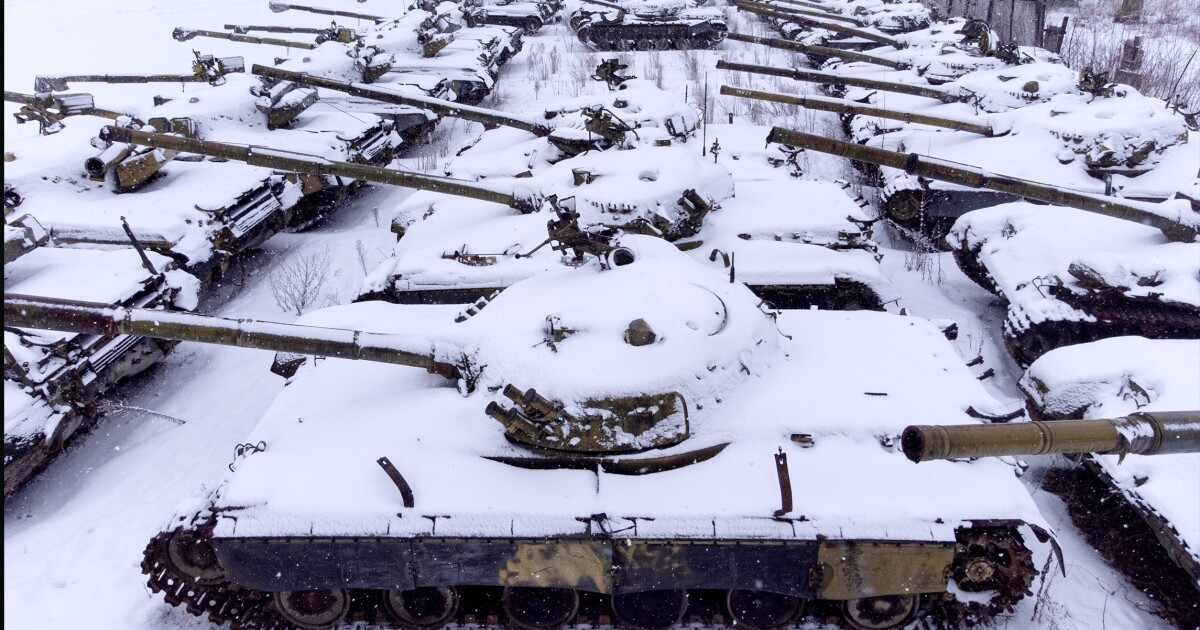

Russian forces have continued to target Ukraine’s energy infrastructure, setting the conditions for a brutal winter for civilians.
Russia has repeatedly lost occupied territory in Ukraine, though it continues to pummel its southern neighbor aerially. That includes launching missiles targeting Ukraine’s energy grid, which Russian leaders argue are legitimate military targets. On Nov. 14, Russia launched an estimated 60 to 100 missiles at various Ukrainian cities, Gen. Mark Milley, the chairman of the Joint Chiefs of Staff, told reporters the next day.
US CONFIRMS POLAND STRIKE ‘LIKELY THE RESULT OF A UKRAINIAN AIR DEFENSE MISSILE’
“With the onset of winter, families will be without power, and more importantly, without heat. Basic human survival and subsistence is going to be severely impacted, and human suffering for the Ukrainian population is going to increase,” Milley said. “These strikes will undoubtedly hinder Ukraine’s ability to care for the sick and the elderly. Their hospitals will be partially operational. The elderly are going to be exposed to the elements.”
The Pentagon thinks roughly a quarter of Ukrainian civilians are now without electricity, Milley said, and Ukrainian officials have said that roughly 30% of the country’s power stations have been destroyed.
Milley called Russia’s deliberate targeting of Ukraine’s civilian power grid “a war crime.” Milley, the highest-ranking military officer in the United States Armed Forces, also noted that Russia occupies roughly 20% of Ukraine’s territory. This includes much of the eastern Ukrainian provinces of Donetsk and Luhansk, as well as Crimea, which Russia annexed illegally in 2014.
Ukrainian officials have asked for assistance from American officials and their counterparts in a half-dozen European allied nations in order to prepare for an extended time with limited gas and electricity. In the U.S., Milley, the Joint Chiefs chairman, warned that Russia’s latest aerial attack would continue and the potential onslaught could overwhelm the country’s ability to bring heat and power back online.
“The Russians are striking throughout the depth and breadth of all of Ukraine with air-launched cruise missiles, with Kalibr sea-launched cruise missiles, and with other types of munitions. They are striking the Ukrainian civilian infrastructure, and it has little or no military purpose,” Milley said. “These missiles, again, they targeted intentionally and damaged civilian power generation facilities to cause unnecessary suffering with the civilian population.”
The U.S. has sought to provide Ukraine with gear for the winter season, as have other allies. The U.S. has committed approximately 50,000 parkas, 4,700 trousers, and 39,000 fleece hats, as well as more than 23,000 boots, 18,000 gloves, and 6,000 tents, deputy Pentagon press secretary Sabrina Singh said last month.
Russian battlefield failures
As Russia continues its monthslong on-and-off air assault across Ukraine, its forces have continued to lose ground in the eastern part of Ukraine. Russian forces recently retreated from the strategically key city of Kherson, which was the only regional capital that Russian forces had captured and occupied. They had held the city since the start of the war, which began in February.
Kherson was one of four regions that the Kremlin sought to annex. While the Russian occupiers went through the motions of a referendum, which they declared overwhelmingly went in favor of joining the Russian Federation, the U.S. and its Western allies unanimously and immediately denounced it as a violation of international law.
Russia’s likelihood of achieving its initial goal of overthrowing the government of Ukrainian President Volodymyr Zelensky is “close to zero,” Milley said.
“I can suppose theoretically it’s possible, maybe, but I don’t see it happening militarily,” Milley said. He later tempered this optimistic appraisal by saying the probability of a full Ukrainian military victory “happening anytime soon is not high.”
Nevertheless, Milley praised the Ukrainian forces’ determination and resolve.
“They wanted to overrun all of Ukraine, and they lost. They didn’t achieve those objectives. They failed to achieve their strategic objectives, and they are now failing to achieve their operational and tactical objectives. The Ukrainians have achieved success after success after success, and the Russians have failed every single time. They’ve lost strategically, they’ve lost operationally, and I repeat, they lost tactically. What they’ve tried to do, they failed at. They started this war and Russia can end this war,” he said.
Through nearly nine months of the war, Russia likely has “well over 100,000” soldiers killed or wounded, Milley said earlier this month, and Ukraine likely has sustained a similar number of casualties, he added.
“The fighting is not going to stop,” Milley said. But both sides will use the winter as an “opportunity to get some rest to do some training to get resupplied.”
Diplomatic efforts
The lull in the fighting does open the possibility of a return to diplomacy. And Ukraine’s latest battleground gains are likely to improve their negotiating hand.
“Politically, there may be a political solution where politically the Russians withdraw. That’s possible. You want to negotiate from a position of strength. Russia, right now, is on its back,” Milley added. “The Russian military is really hurting bad. So, you want to negotiate at a time when you’re at your strength and your opponent is at their greatest weakness. And it’s possible, maybe, that there will be a political solution.”
CLICK HERE TO READ MORE FROM THE WASHINGTON EXAMINER
The winter months will also diminish the fighting between both sides as the conditions worsen.
Last week, Colin H. Kahl, the undersecretary of defense for policy, told reporters that the “sloppy weather in Ukraine” is already slowing the fighting, at least a bit.
“It’s getting really muddy, which makes it hard to do large-scale offensives. I think that that challenge is going to get worse in the coming weeks. So we’ll have to see whether the fighting slows down as a consequence of that,” he said.







